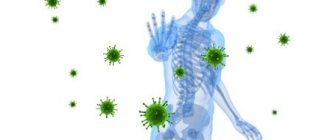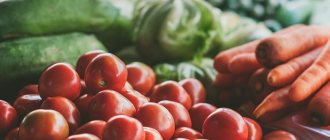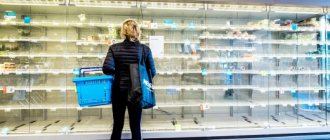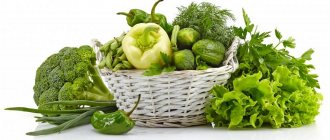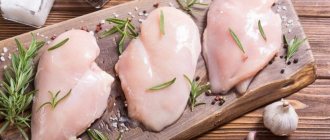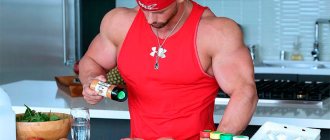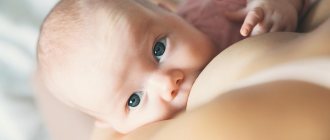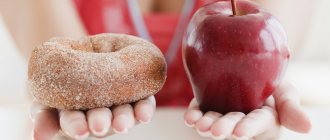Medical editor: Zemereva N.Yu., physiotherapist
If you eat food that is of poor quality or improperly prepared, symptoms of food poisoning or foodborne illness may occur.
The disease is caused not by the pathogenic microbes themselves that are found in food products, but by substances formed during their vital activity and which are toxic to humans.
A diet for food poisoning will help quickly overcome the disease and help a person “get back on track.”
Products allowed for food poisoning
The diet for food poisoning, as mentioned above, is expanded gradually.
The food must contain the required amount of proteins, mostly of animal origin, since they are the ones needed for the construction of new cells and the regeneration of the mucous membranes of the digestive tract.
Complex carbohydrates are also necessary, but only in processed form: compotes, jelly from sweet fruits and berries. They are involved in the production of glycogen in the liver, thereby enhancing its detoxifying function.
Don't forget about vitamins. Ascorbic acid stimulates the body's defenses, strengthens vascular walls, and ensures the integrity of mucosal epithelial cells. Vitamins A and E are necessary in the fight against free radicals formed during inflammation. B vitamins are needed for normal digestion.
The list of permitted products includes:
- weak or secondary (the first water after boiling is drained) broths from meat, fish and poultry;
- slimy soups from semolina, rice, oatmeal, after the 3rd day you can add a milk-egg mixture, cream or butter to them;
- lean meats and poultry (without skin) rolled and boiled (rabbit, “white” chicken meat, veal, beef): meatballs, soufflé, steamed cutlets - on the 4-5th day;
- low-fat fish in the form of steam soufflé;
- pureed porridge from rice, buckwheat, oatmeal;
- low-fat milk, non-sour pureed cottage cheese;
- soft-boiled eggs or steam omelettes;
- butter in small quantities or vegetable oil for the finished dish;
- wheat bread croutons, crackers, biscuits;
- compotes, jelly, jellies, mousses from sweet fruits and berries;
- natural juices with sugar, diluted with water 1:1, weak tea with milk, water acidified with lemon, rosehip decoction, dried fruit compote, dill water.
Diet after poisoning
What can you eat and drink during and after poisoning? You should not eat food on the first day. It is necessary to drink water and special saline solutions frequently. At the first signs of poisoning, it is recommended to take natural sorbents, such as Filtrum. The filter helps remove pathogenic bacteria and bacterial toxins from the body.
Filtrum is a quick remedy for the treatment of diarrhea of any etiology (infectious diarrhea - loperamide is contraindicated, parasitic or rotavirus infection - antibiotics are useless, activated carbon is ineffective)
What can you eat next?
Summary table of nutrition after poisoning
| 1 day | Day 2 | Day 3 | 4 day | 5 day |
| you can't eat anything | vegetable broth | vegetable broth | chicken bouillon | chicken bouillon |
| vegetable puree | vegetable puree | vegetable casserole | vegetable casserole | |
| crackers | crackers | fish | rice porrige | |
| rice porrige | crackers | crackers | ||
| rice porrige | boiled fish |
On the second day it is recommended:
- 200 ml vegetable broth;
- 2-3 crackers;
- 100 ml liquid vegetable puree.
The amount of liquid is up to 2 liters. You can drink boiled water, rosehip decoction, alkaline mineral waters without gas, saline pharmaceutical solutions.
On the third day, you can introduce cereals into your diet.
Proper volume of products:
- 200 ml vegetable broth;
- 300 g of rice porridge, liquid and boiled in water;
- crackers (up to 4 pcs.) and biscuits (2-3 pcs.).
Starting from the fourth day, the volume and list of products expands, it is possible to add chicken broth and lean fish (pike perch).
Daily ration:
- 200 g vegetable casserole with semolina (without eggs),
- 100-150 ml of chicken broth (bring to a boil for the first time and drain the broth, pour water over the chicken again and prepare the dish);
- 100 g boiled fish;
- crackers (4-5 pcs.) and biscuits (5-6 pcs.);
When preparing fish and chicken broth, do not add vegetables or spices, just add a little salt.
On the fifth day, it is necessary to continue expanding the diet. Recommended dishes include chicken, rice, and cottage cheese:
- 300-400 ml chicken broth with chicken meatballs;
- 200-300 g boiled rice;
- 200-300 g casserole or cottage cheese soufflé (without eggs);
- crackers up to 5-6 pcs.
Prohibited Products
The list of prohibited foods is huge, you can only reassure yourself that you don’t need to follow the diet for long.
All foods that increase the secretion of gastric juice, pancreas and duodenum are excluded from the diet in order to reduce the irritating effect of hydrochloric acid and enzymes on the mucous membranes of the digestive tract.
You should also avoid all natural and, of course, synthetic irritants. Excessively salty and spicy foods, foods rich in essential oils and organic acids are not allowed.
Complex carbohydrates contained in plant fiber are prohibited. They increase the load on the digestive tract, enhance fermentation processes, which irritate its mucous membranes, causing bloating and pain.
In the first days of therapeutic nutrition after food poisoning, fats are limited, since the body spends a significant part of energy on their breakdown; in addition, they, enveloping the mucous membranes of the stomach and intestines, slow down the absorption of nutrients and increase the symptoms of dyspepsia (vomiting, diarrhea).
The list of prohibited items includes:
- bread and all baked goods;
- rich broths and complex soups (borscht, okroshka, rassolnik);
- fatty meats, fish and poultry, as well as stringy meat;
- any canned food;
- mushrooms in any form;
- all vegetables;
- sausages;
- fast food and convenience foods;
- cheeses, sour cream and all fermented milk products;
- coarse cereals: pearl barley, barley, corn;
- legumes (canned green peas with caution);
- pickles, smoked meats, marinades;
- vinegar, horseradish, pepper, spicy seasonings, mustard;
- sour fruits, berries and fresh vegetables (radish, radish, sorrel, currants, green apples, etc.);
- concentrated juices, strong tea, coffee, cocoa, sweet carbonated drinks;
- sauces (ketchup, mayonnaise).
Fully or partially limited products
The diet for acute food poisoning prohibits the use of:
- fresh bread of all types, pastries and bakery products;
- rich broths and soups on them;
- fatty meats, fish, waterfowl meat, sausages, smoked meats, solid animal fats, canned foods;
- fresh vegetables, fruits and mushrooms;
- coarse cereal products (millet, barley, pearl barley);
- semi-finished products, fast food;
- fatty fermented milk products, cheese, sour cream;
- marinades, legumes, pickles;
- spices, vinegar, mustard and horseradish
- hot sauces, mayonnaise, ketchup
- coffee, strong tea, cola, carbonated drinks, chocolate, ice cream, concentrated packaged juices.
Table of prohibited products
| Proteins, g | Fats, g | Carbohydrates, g | Calories, kcal | |
Vegetables and greens | ||||
| spicy vegetables | 2,8 | 0,5 | 5,3 | 36 |
| vegetables legumes | 9,1 | 1,6 | 27,0 | 168 |
| canned vegetables | 1,5 | 0,2 | 5,5 | 30 |
| swede | 1,2 | 0,1 | 7,7 | 37 |
| cabbage | 1,8 | 0,1 | 4,7 | 27 |
| sauerkraut | 1,8 | 0,1 | 4,4 | 19 |
| cauliflower | 2,5 | 0,3 | 5,4 | 30 |
| bulb onions | 1,4 | 0,0 | 10,4 | 41 |
| cucumbers | 0,8 | 0,1 | 2,8 | 15 |
| canned cucumbers | 2,8 | 0,0 | 1,3 | 16 |
| pickles | 0,8 | 0,1 | 1,7 | 11 |
| radish | 1,2 | 0,1 | 3,4 | 19 |
| white radish | 1,4 | 0,0 | 4,1 | 21 |
| turnip | 1,5 | 0,1 | 6,2 | 30 |
| canned tomatoes | 1,1 | 0,1 | 3,5 | 20 |
| garlic | 6,5 | 0,5 | 29,9 | 143 |
Fruits | ||||
| pears | 0,4 | 0,3 | 10,9 | 42 |
Berries | ||||
| grape | 0,6 | 0,2 | 16,8 | 65 |
Mushrooms | ||||
| mushrooms | 3,5 | 2,0 | 2,5 | 30 |
| marinated mushrooms | 2,2 | 0,4 | 0,0 | 20 |
Nuts and dried fruits | ||||
| nuts | 15,0 | 40,0 | 20,0 | 500 |
Cereals and porridges | ||||
| corn grits | 8,3 | 1,2 | 75,0 | 337 |
| pearl barley | 9,3 | 1,1 | 73,7 | 320 |
| Wheat groats | 11,5 | 1,3 | 62,0 | 316 |
| millet cereal | 11,5 | 3,3 | 69,3 | 348 |
| barley grits | 10,4 | 1,3 | 66,3 | 324 |
Flour and pasta | ||||
| pasta | 10,4 | 1,1 | 69,7 | 337 |
Bakery products | ||||
| Old Russian grain bread | 9,6 | 2,7 | 47,1 | 252 |
| Rye bread | 6,6 | 1,2 | 34,2 | 165 |
Confectionery | ||||
| candies | 4,3 | 19,8 | 67,5 | 453 |
| cake | 3,8 | 22,6 | 47,0 | 397 |
Chocolate | ||||
| chocolate | 5,4 | 35,3 | 56,5 | 544 |
Raw materials and seasonings | ||||
| ketchup | 1,8 | 1,0 | 22,2 | 93 |
| mayonnaise | 2,4 | 67,0 | 3,9 | 627 |
| soy sauce | 3,5 | 0,0 | 11,0 | 58 |
| vinegar | 0,0 | 0,0 | 5,0 | 20 |
Dairy | ||||
| milk 4.5% | 3,1 | 4,5 | 4,7 | 72 |
| cream | 2,8 | 20,0 | 3,7 | 205 |
Meat products | ||||
| pork | 16,0 | 21,6 | 0,0 | 259 |
Sausages | ||||
| dry-cured sausage | 24,1 | 38,3 | 1,0 | 455 |
Bird | ||||
| smoked chicken | 27,5 | 8,2 | 0,0 | 184 |
| duck | 16,5 | 61,2 | 0,0 | 346 |
| smoked duck | 19,0 | 28,4 | 0,0 | 337 |
| goose | 16,1 | 33,3 | 0,0 | 364 |
Fish and seafood | ||||
| dried fish | 17,5 | 4,6 | 0,0 | 139 |
| smoked fish | 26,8 | 9,9 | 0,0 | 196 |
| canned fish | 17,5 | 2,0 | 0,0 | 88 |
Oils and fats | ||||
| animal fat | 0,0 | 99,7 | 0,0 | 897 |
| cooking fat | 0,0 | 99,7 | 0,0 | 897 |
Alcoholic drinks | ||||
| vodka | 0,0 | 0,0 | 0,1 | 235 |
| beer | 0,3 | 0,0 | 4,6 | 42 |
Non-alcoholic drinks | ||||
| cola | 0,0 | 0,0 | 10,4 | 42 |
| lemonade | 0,0 | 0,0 | 6,4 | 26 |
| Pepsi | 0,0 | 0,0 | 8,7 | 38 |
| sprite | 0,1 | 0,0 | 7,0 | 29 |
| black tea | 20,0 | 5,1 | 6,9 | 152 |
Juices and compotes | ||||
| tomato juice | 1,1 | 0,2 | 3,8 | 21 |
| * data is per 100 g of product | ||||
Basic rules of nutrition for food poisoning
The purpose of the diet for food poisoning is to ensure maximum comfort of the digestive tract, which is achieved by chemical, mechanical and thermal sparing.
During poisoning, diarrhea and vomiting occur, often uncontrollable, therefore the objectives of therapeutic nutrition are:
- restoration of electrolyte balance;
- reduction of dehydration and inflammatory reaction of the gastrointestinal tract;
- acceleration of mucosal healing processes.
Among other things, it is necessary to replenish the body with proteins, vitamins and minerals.
According to the Pevzner classification, the diet for food poisoning is treatment table No. 1a.
Daily requirement of proteins, fats and carbohydrates:
- fats – 80-90g, of which at least 20% vegetable fats;
- proteins – 80g, of which up to 60-70% are proteins of animal origin;
- carbohydrates – 200g.
Due to the restriction of nutrients in case of food poisoning to the lower limit of the physiological norm, the daily calorie content of the diet is 1900-2000 kilocalories.
Basic principles
Diet. Meals should be fractional, up to 6-7 times a day. In the first three days, the volume of food is 150-200 ml, then gradually increases. Frequent meals in small portions reduce the load on the irritated mucous membrane of the digestive tract, allow food to be absorbed, which is quite problematic with diarrhea and vomiting, gradually stimulate the appetite and activate the digestive tract.
Drinking regime. In case of food poisoning, it is very important to maintain a drinking regime. You should take at least 2 liters of fluid per day. Firstly, it helps remove toxins from the body, and secondly, it restores the volume of the vascular bed and prevents dehydration. On the first day after poisoning, it is better to avoid eating altogether and only drink. The liquid is taken in small portions (50-100 ml) every 30 minutes, since large volumes of drinking provoke vomiting. You can use boiled or mineral water without gas, as well as special solutions from powders (“Hydrolit”, “Oralit”, “Regidron”).
Culinary processing. Considering that the diet should provide mechanical sparing of the gastrointestinal tract, the food must contain boiled or steamed dishes in a mashed or pureed state. The minced meat is turned twice. Thus, the load on the stomach and all digestive organs is significantly reduced, they work in an economical mode, and nutrients are better absorbed. In addition, you must chew your food thoroughly.
Temperature conditions. Food and liquid consumed must be served warm (15-50°C). Food that is too cold or too hot causes reflex spasms of the sphincters of the stomach and esophagus and promotes vomiting. In addition, cold or hot food irritates the damaged epithelium of the digestive tract and slows down regeneration.
Salt. Table salt consumption is somewhat limited: up to 6-8g per day. Too salty food and drink irritate the gastrointestinal tract and prevent the restoration of its mucous membranes.
Alcohol. During treatment, especially in the first week, when the diet is strict, the consumption of any alcoholic beverages is prohibited. Alcohol has an irritating effect on the digestive organs, interferes with regeneration processes, and provokes vomiting. If this condition is not met, the liver and kidneys, which were particularly damaged during the attack by food toxins, will begin to function even worse.
Duration of the diet. The duration of a strict diet is approximately 4-7 days. The return to normal nutrition is carried out gradually and with caution: one or two new dishes/products are introduced per day.
Diet after poisoning: simple recipes and recommended products
Against the backdrop of recovery, the menu is gradually expanding. It is recommended to include meat broths, especially bone broths, oatmeal, and baked poultry (without skin) in your diet. The main thing is to eat in small portions. Such products are useful due to their neutral taste, nutritional value and content of substances that will help you recover faster. But what is most important is the source of protein, which is used to restore the body. In the healing process, restoration of the intestinal microbiome is of great importance, therefore it is recommended to include in the diet foods that help restore microbial balance. Healthy foods include yogurt, sauerkraut, etc.
Drinks to prevent dehydration
Vomiting and diarrhea are inevitable accompaniments of poisoning, even alcoholic poisoning. As a result, not only liquid is lost, but also minerals. Oral rehydration solutions may be required to prevent and treat dehydration. But it is also acceptable to drink tea, especially herbal tea, compotes, fruit drinks, and mineral water. For example, peppermint tea will help not only cope with dehydration, but also relieve an upset stomach.
List of prohibited products
Food poisoning is associated with inflammation and irritation of the digestive tract. Therefore, the diet is composed of those that do not cause excessive stimulation of the stomach and do not have an irritating effect. There are several food groups that need to be excluded during illness:
- Dairy
Not all dairy products are beneficial during the recovery phase. For example, cheeses and full-fat milk can cause irritation of the stomach walls and aggravate symptoms.
- Bold
Fried, fatty, fast food, as well as other foods with a high percentage of fat can cause worsening diarrhea, as well as abdominal pain.
- Acute
Spicy foods and marinades are products that cause severe stomach irritation, which can lead to upset and worsening symptoms.
- Foods that cause bloating
Fermentable carbohydrates are the main enemy of well-being during recovery. Products containing them lead to frequent bloating, especially if there are contributing factors. For example, irritable bowel syndrome. Therefore, you need to exclude beans, cabbage, onions, garlic, etc. from your diet.
What drinks should you avoid?
To prevent and treat dehydration, you must strictly adhere to the drinking regime. But not all liquids and drinks are useful; some of them can cause serious consequences and complications. During the stages of recovery, eliminate or at least reduce the use of:
- coffee;
- sweet sodas;
- milk;
- tea with caffeine.
Abuse of such drinks is a cause of complications. Instead of replenishing your electrolytes, dehydration may only get worse. As for milk, some people develop lactose intolerance due to intestinal infections. And when they are consumed, signs of intolerance form: nausea, flatulence, etc.
Warning signs
Mild to moderate food poisoning can be treated with over-the-counter treatments. But if the following symptoms appear, you should seek medical help:
- blood in the stool;
- symptoms of dehydration: rare urination, dry mouth, dizziness;
- diarrhea that lasts more than three days;
- temperature increase over 39º C;
- repeated vomiting that lasts more than a day.
When such symptoms appear, additional fluid administration is necessary, but vomiting and diarrhea interfere with its absorption. Within the walls of the hospital, the doctor will prescribe treatment that stops vomiting and diarrhea. If indicated, antibiotics are prescribed that target the cause of intestinal infections.
Finally
The causes of intestinal infections and poisoning can be not only bacteria, but also viruses.
But regardless of this, measures must be taken. For example, a diet after drinking alcohol also implies adherence to a drinking regime; food should be gentle and not irritating. But if a single alarming symptom appears, even if it seems to you that the crisis has passed and you are recovering, you need to seek medical help and begin treatment that will help avoid complications. Text: Yulia Lapushkina.
Reviews and results
In case of acute food poisoning, diet is the most important component of complex treatment and, according to reviews from most patients, it is effective and promotes rapid recovery.
- “... After eating watermelons, severe diarrhea began, vomiting appeared and the temperature rose. Later, severe headache, dizziness, weakness, and shortness of breath appeared. A doctor was called and diagnosed food poisoning (nitrates). Even before the doctor arrived, we began to rinse our stomach and drank several tablets of white activated carbon. It is recommended to drink plenty of fluids, take saline solutions, and eat a diet excluding meat, fats, sweets, raw vegetables and fruits. And only after 3 days the stool became more or less normal, and the vomiting stopped. The effects of poisoning were felt for a long time, and I had to be on a diet for almost a month. Now I am very careful about all early vegetables and fruits”;
- “... I was poisoned at a friend’s wedding by a cake, from which, as I was told, they managed to isolate staphylococcus. The cake was ordered to a private person and was prepared at home, obviously in violation of technology. 12 people were poisoned. There was a fever, cramping abdominal pain, diarrhea, severe vomiting, lethargy, and weakness. At the ambulance the stomach was washed out and enterosorbents were given. All were hospitalized in the infectious diseases department. They prescribed a drip with saline solutions, antispasmodics, and enzyme preparations. I was discharged on the 4th day and prescribed a diet with plenty of fluids, which I was on for two weeks.”
